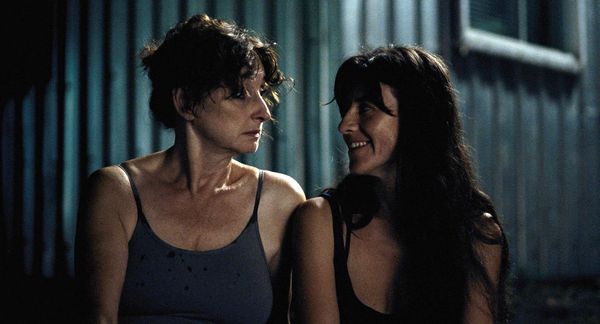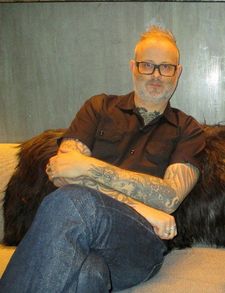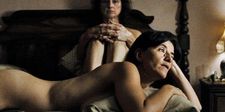 |
| Pierrette Robitaille and Romane Bohringer in Vic + Flo Saw A Bear |
Your films frequently contain very striking female characters - and in the case of Vic + Flo Saw A Bear there are three of them, with the men falling firmly in their shadow. Could you tell us a bit about that choice? Do you think that female protagonists offer you more scope than male ones?
 |
| Denis Côté and a bearskin: "I love to twist reality. I like to be one foot outside of it." Photo: Anne-Katrin Titze |
Notions of captivity - forced and self-exile - and freedom also haunt your work, from the animals in captivity in Bestiare to the two halves of the coin here, with Vic embracing the notion of freedom offered to her by the forest and Flo seeing it more as a place of confinement, even though she is also trying in her own way to escape. How important is it to you to draw on these natural environments and present them in an ambivalent way - neither as friend or foe?
DC: A film or a story must be ambivalent, ambiguous, my way of looking at things must be oblique. It gives space to the audience. It creates the uncomfortable (and rewarding) feeling that anything can happen in such a story. It’s free. I think my films are like myself: a constant fight between the need to be free (make those personal films without any concessions) and the necessity to be trapped (I work in what we call ‘the industry’ and it’s not easy). Maybe we deal with psychoanalysis here but I think my films talk about me.
 |
| Côté: "I hate being comfortable. I need danger." |
DC: The whole scene is faked, with extras. It’s not a real prison. It was supposed to be the ending of the film. It became some sort of souvenir at mid-film instead of a real ending.
You don't usually opt for scoring in your films but here you have strong percussive interludes that serve to ratchet up the tension and instruct the viewer that although things may look peaceful, trouble is on the horizon. What prompted the decision and how difficult was it to settle on a score?
DC: I never use much music, it’s true, but for Vic + Flo I approached a musician, Melissa Lavergne. I thought she would propose something very simple but it ended up being very interesting. The percussion is like a character or even a narrator telling you: don’t worry, something is coming. It has a fairytale quality as well. I basically fell in love with what Melissa proposed.
There's a sense of magic realism and fairytale running through your film, from the 'bear' of the title through to the almost dreamlike coda. Was it always your intention to mix the mundane with the mystical and how hard was it to strike a balance?
DC: I would never use the term magic realism because there are terrible movies fitting that definition. I am not a fan of fantasy films but it’s absolutely true that I love to twist reality. I like to be one foot outside of it. It looks like it could happen but is it realistic? I play on that distortion and again I’m sometimes able to find that no-comfort zone for the audience.
 |
| Pierrette Robitaille and Romane Bohringer in Vic + Flo Saw A Bear |
DC: Being a cinephile and an ex film critic stole a bit of my naivety or my innocence. I’m obsessed with proposing something different, something that could surprise. It’s my duty to be angry at everything that’s been done before and it’s my duty to try things, much more than just tell a good entertaining story. I hate being comfortable. I need danger. Some films like Carcasses, or even Bestiaire, are quite ballsy. We came this close to putting everything in the garbage. Those are lab films. You are not always sure what’s cooking when you do it but there’s great excitement when you meet an audience.
Does your work in documentary inform your fictional features or vice versa and do you prefer one form over the other or intend to continue to make both? DC: I am definitely haunted by film language and clashes between genres. The films end up being a bit cold and cerebral but I must follow my obsessions. I think all my films are fiction because I have a strong desire for it. Bigger or smaller films, bigger or smaller budgets and ambitions, I always want the viewer to be in danger. You never know what you are watching and what can happen and I think it can be rewarding and exciting. It’s the kind of viewer I am anyway. I’m impressed by dangers and risks filmmakers take making a film, not by master cinematography, master storytelling. I like that impression that a film can fall apart at any second.
Your next work will be The Joy Of Man's Desiring - which will play at the Berlin Film Festival next week. Can you tell us about the project?
DC: JoMD is an allegory on the idea of work. I am looking for an abstract dialogue between men and machines but I was also obsessed by this absurd idea that one must work to access some sort of peace and rest at the end of his life. The result is a very oblique docufiction. I hope I found some poetry amidst all the noisy abstraction the film contains.
Vic + Flo Saw a Bear - Official Trailer from KimStim on Vimeo.





















